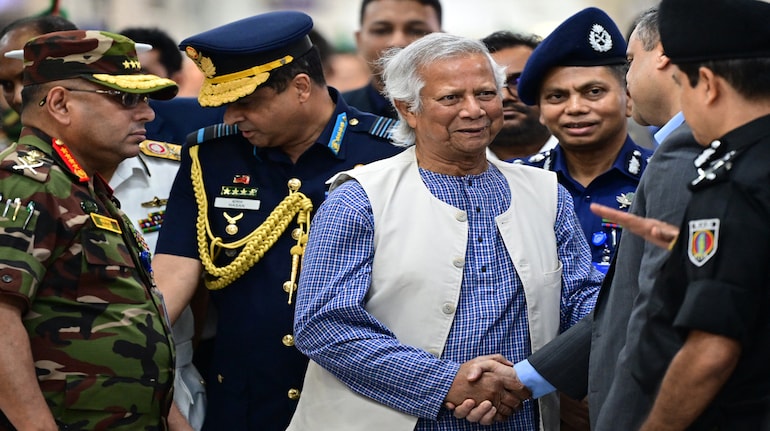
A deepening rift between Bangladesh’s interim government leader Muhammad Yunus and Army Chief General Waker-uz-Zaman over the timeline for national elections has exposed simmering tensions between the caretaker administration and the military. The dispute, centered on whether to hold polls by December 2025 or delay them until mid-2026, threatens to destabilize the fragile political transition that began after Prime Minister Sheikh Hasina’s ouster in August 2024.
The Contested Timelines
The conflict crystallized on May 21, 2025, when General Zaman publicly insisted that elections must be held by December 2025 to ensure a democratically elected government assumes power by early 2026. This stance aligns with demands from the Bangladesh Nationalist Party (BNP), which has warned of a “black shadow” over democracy if voting is postponed. However, Yunus and his advisers have repeatedly emphasized that their mandate extends beyond elections to include systemic reforms and justice initiatives, suggesting polls could be delayed until June 2026.
Environment Adviser Syeda Rizwana Hasan articulated the interim government’s position: “We have three major responsibilities—reform, justice, and election. We did not take charge just to hold an election”. Special Adviser Faiz Ahmad Taiyeb hinted that April–May 2026 is a more realistic window, citing the complexity of overhauling institutions and electoral rolls. This divergence reflects broader disagreements over priorities, with the military viewing prolonged interim rule as a threat to stability and the Yunus administration arguing that rushed elections could undermine lasting change.
Military’s Growing Impatience
General Zaman, who played a pivotal role in facilitating Yunus’s rise to power, has grown increasingly critical of the caretaker government’s governance. At a May 21 meeting with Yunus and other service chiefs, Zaman reportedly emphasized the need for electoral clarity and warned against delays. His stance enjoys support within the officer corps, which views the interim administration’s indecision as exacerbating political and economic instability.
The army chief’s frustration stems partly from the interim government’s controversial policy moves, including a proposed corridor linking Cox’s Bazar to Myanmar’s Rakhine State—a plan seen as favoring Rohingya repatriation but criticized for bypassing military input. National Security Adviser Khalilur Rahman, architect of the proposal, has become a lightning rod for criticism, with the BNP demanding his removal over allegations of compromising national interests.
Political Pressures and Reforms
Yunus, a Nobel laureate appointed after student-led protests toppled Hasina, faces mounting pressure from all sides. The BNP and Jamaat-e-Islami, which initially supported his interim administration, now accuse him of overstepping his mandate by prioritizing reforms over elections. Meanwhile, the National Citizens Party (NCP)—composed largely of former student protesters—backs Yunus’s agenda but opposes BNP influence in the cabinet.
The interim government’s reform efforts include purging Hasina-era officials, revising voter lists, and investigating wartime crimes. These measures, while popular with activists, have drawn criticism for their slow pace. As Special Adviser Taiyeb noted, “Announcing the exact election date is solely within Dr. Yunus’s jurisdiction. No one else can hijack that authority”.
Implications for Democracy
The standoff underscores Bangladesh’s precarious balance between military influence and civilian governance. Historically, the military has played a kingmaker role during political crises, most notably during the 2007–2008 caretaker government. General Zaman’s intervention echoes this pattern, raising concerns about a return to indirect military rule.
For now, Yunus retains the backing of his advisory council, which reaffirmed his leadership during a closed-door meeting on May 24. However, the military’s warnings against “mob violence” and insistence on electoral deadlines suggest diminishing patience. With the BNP planning post-Eid protests to demand December elections, Bangladesh’s path to democracy remains fraught with uncertainty.
The Yunus-Zaman feud reflects deeper tensions over Bangladesh’s democratic future. While the interim government seeks to dismantle systemic corruption and ensure free elections, the military prioritizes swift political normalization. How these competing visions reconcile—or collide—will determine whether Bangladesh transitions to stable democracy or reverts to its cycle of coups and countercoups. As citizens await clarity, the specter of military intervention looms, a reminder of the nation’s enduring struggle to balance reform with stability
Comments
Post a Comment